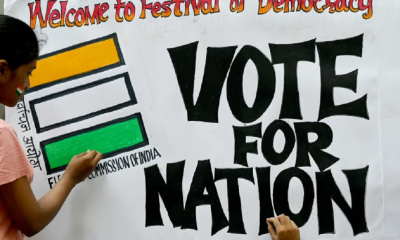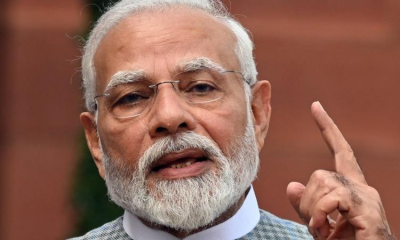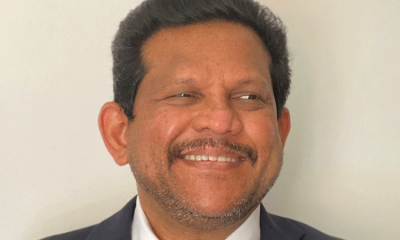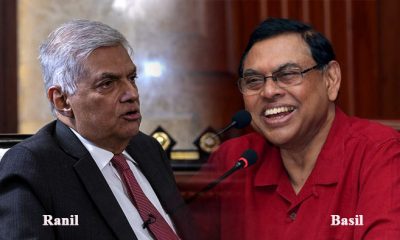Foreign News
India parliament: Security scare for MPs on attack anniversary
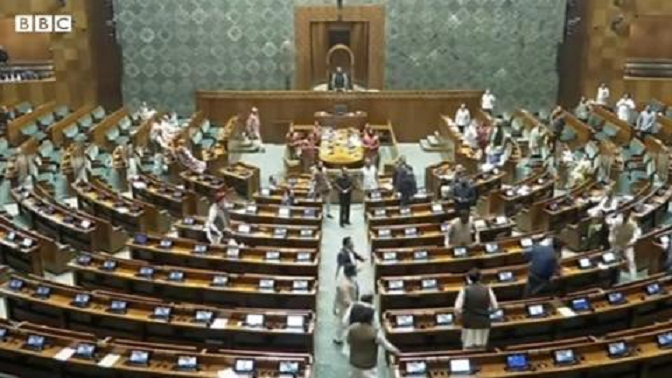
India’s parliament witnessed chaotic scenes after at least two men intruded into the chamber, shouting slogans and spraying coloured gas.
Images show MPs and security officials trying to catch one of the intruders, who is seen jumping from table to table.
Reports say the men were overpowered by security officials and taken away. The security breach occurred on the 22nd anniversary of a deadly terror attack on India’s parliament.
Lawmakers said the two men jumped into the well of the house from the visitors’ gallery. Their motive is not clear.
The incident occurred while lawmakers were in session in the Lok Sabha, the lower house of India’s parliament. Both houses were suspended for a short period before the session resumed.
“We are investigating the matter and have asked Delhi Police to join the inquiry,” Lok Sabha speaker Om Birla said. He added that according to the preliminary investigation, the smoke sprayed in the house appeared to be “harmless”.
Two other people – a man and a woman – have also been detained for protesting outside the parliament by setting off canisters of coloured gas. They were pictured being led away by police. “Two people jumped from the public gallery and there was smoke. There was chaos all around. Both of them were overpowered by security officials,” lawmaker Danish Ali told reporters outside parliament.
The breach occurred on the 22nd anniversary of a deadly attack on India’s parliament, in which 14 people, including five of the attackers, were killed.
Earlier in the day, President Droupadi Murmu, Prime Minister Narendra Modi and other leaders had paid tribute to the victims of the 2001 attack on parliament – 14 people, including the five attackers, were killed on the day.
Karti Chidambaram, an MP from the Congress party, said he was waiting for his turn to speak when chaos broke out. “Suddenly, it appeared that one person had fallen down from the visitors’ gallery. Then we realised that it was a deliberate act of him jumping into the well. There was another person, both of them pulled out canisters which were emitting yellow smoke,” he said.
(BBC)
Foreign News
Ukraine parliament passes bill for prisoners to join army
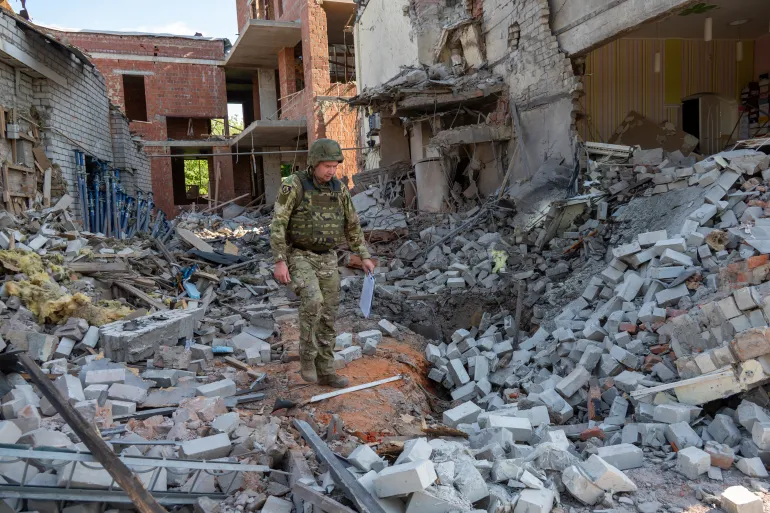
Ukraine’s parliament has passed a bill that would enable some prisoners to fight in the armed forces as the military faces a critical personnel shortage and Russian forces continue to advance on the battlefield.
The move on Wednesday marks a U-turn in Ukraine’s approach on the matter. Kyiv had long opposed the measure and had repeatedly criticised Moscow for mobilising prisoners to fill its ranks.
“The parliament has voted yes,” MP Olena Shuliak, head of Zelenskyy’s party, said in a Facebook post. “The draft law opens the possibility for certain categories of prisoners who expressed a desire to defend their country to join the Defence Forces,” she said.
Mobilisation would be voluntary and open only to certain categories of prisoners.
Among those not eligible to serve include those found guilty of sexual violence, killing two or more people, serious corruption and former high-ranking officials, Shuliak said.
Only prisoners with under three years left to serve on their sentence may apply, she said. Any prisoners who are mobilised would be granted parole rather than a pardon.

The organisation Protection for Prisoners of Ukraine, which had lobbied for a measure allowing prisoners to fight, was disappointed with the adopted text.
“We support the idea behind the law, … but the text that was passed is discriminatory,” the NGO’s head, Oleg Tsvily, said.
“They got rid of leave for [fighting] prisoners, and we don’t know if they’re meant to fight until the war ends – which could mean longer than their sentence,” he explained.
Tsvily said he feared the creation of “special units” for mobilised soldiers would lead to abuse against prisoners.
“It’s like in Russia – redemption by blood. … Anyone willing to fight will be put in one unit and commanded like meat,” he said.
He was referring to reported practices of the Wagner mercenary group of sending waves of convicts into assaults likened to “meat grinders”.
Russia has recruited prisoners to serve on the front lines since the first days of its invasion in February 2022, initially offering presidential pardons for six months of service.
The practice was spearheaded by Yevgeny Prigozhin, who was filmed touring Russian prisons to recruit foot soldiers for his Wagner Group.
More than two years into the war, Kyiv is grappling with how to recruit enough soldiers to repel an intensification of Russian attacks on the front lines.
It has recently toughened measures against draft dodgers and lowered the age at which men can be drafted from 27 to 25.
(Aljazeera)
Foreign News
Biden to halt some arms supplies if Israel invades Rafah

President Joe Biden has warned Israel that the US will stop supplying some weapons if it launches a major ground operation in the Gaza city of Rafah.
“If they go into Rafah, I’m not supplying the weapons that have been used historically to deal with Rafah,” he said during an interview with CNN.
He added that he would “continue to make sure Israel is secure”.
Despite firm and vocal US opposition, Israel appears poised to mount a large-scale invasion of Rafah.
The congested part of southern Gaza is Hamas’s last major stronghold in the territory. US officials have warned that an operation in the city – where the population has swelled with refugees from other parts of Gaza – could lead to extensive civilian casualties.
“We’re not going to supply the weapons and artillery shells,” Mr Biden said in the interview, which aired on Wednesday.
He said the US did not define the current situation in Rafah as a ground operation. “They haven’t gone into the population centres. What they did is right on the border,” he said.
“But I’ve made it clear to [Israeli Prime Minister Netanyahu] and the war cabinet, they’re not going to get our support, if in fact they go in these population centres.”
Mr Biden acknowledged that US weapons had been used by Israel to kill civilians in Gaza.
When asked if Israel had crossed a “red line”, the US president replied “not yet”.
The comments amount to the president’s strongest warning yet over a potential ground invasion of Rafah, and mark the first time he has said the US could stop shipments of American weapons to Israel.
Israel’s ambassador to the UN said the country was “very disappointed” by Mr Biden’s intervention. “This is a difficult and very disappointing statement to hear from a president to whom we have been grateful since the beginning of the war,” Gilad Erdan told Israeli public broadcaster Kan radio.
The US has already delayed a shipment of thousands of bombs to Israel, and has said it is reviewing future deliveries.
On Wednesday, Defence Secretary Lloyd Austin confirmed the delay of the bomb shipment – some of the most destructive munitions in Western military arsenals – while testifying in front of the Senate.
The weapons being held back by the US are related to a future delivery, so the move is unlikely to have an immediate impact. But given the rate at which Israel is bombing it will probably affect future strikes fairly soon.
The Israeli military, meanwhile, has said that the two countries will resolve disagreements “behind closed doors”.
(BBC)
Foreign News
Little chance of change as Vladimir Putin is sworn in again
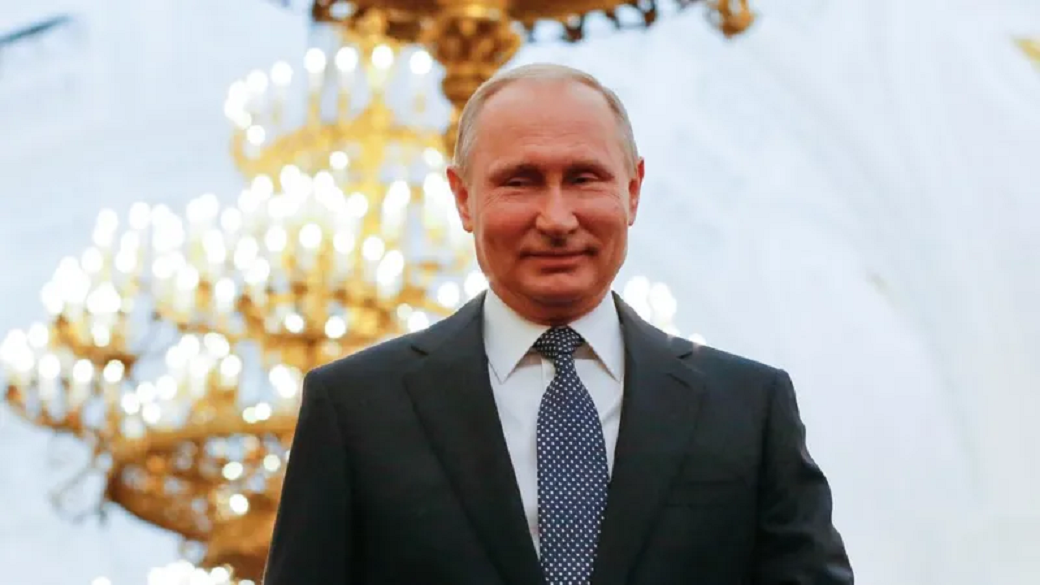
For the fifth time Vladimir Putin will be taking the long walk through the Grand Kremlin Palace to the St Andrew’s Throne Hall. There he will take the oath of office and be sworn in as Russia’s president for a new six-year term
The route may be familiar, but much has changed since Putin’s first inauguration ceremony in May 2000. Back then, President Putin pledged to “preserve and develop democracy” and to “take care of Russia.”
Twenty-four years on, the Kremlin leader is waging war against Ukraine; a war in which Russia has suffered heavy losses. At home, instead of developing democracy, President Putin has been curtailing it: jailing critics, removing all checks and balances on his power.
“Putin thinks of himself now as Vladimir the Great, as a Russian tsar,” believes Fiona Hill, a former White House national security advisor. “If we took ourselves back to his first two presidential terms, I think we’d have a fairly favourable assessment of Putin. He stabilised the country politically and made it solvent again. The Russian economy and system were performing better than at any other previous time in its history. “The war in Ukraine, going back to the annexation of Crimea 10 years ago, has dramatically changed that trajectory. He’s turned himself into an imperialist instead of a pragmatist.”
It’s remarkable to think that since Vladimir Putin first came to power, America has been through five different presidents and Britain has had seven prime ministers.
After nearly a quarter of a century running Russia, Mr Putin has certainly made his mark. In the past, people rarely spoke of “Brezhnevism”, “Gorbachevisim” or “Yeltsinism”. But Putinism: that’s a thing.
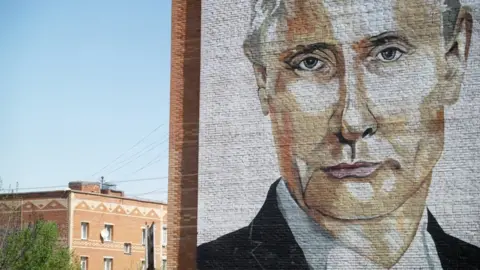
Most people have grown used to one man running Russia and no imminent prospect of change in the Kremlin (BBC)
“We have one more -ism in our history: Stalinism,” says Andrei Kolesnikov, senior fellow at the Carnegie Eurasia Russia Centre.
“I would say that Putinism is one more incarnation of Stalinism. He behaves like [former Soviet dictator] Stalin. His power is personalised like in Stalin’s time. He prefers to use a lot of political repressions. And like Stalin he is ready to keep himself in power until the physical end.”
The challenge, for the West, is how to deal with an increasingly authoritarian Russian leader determined to restore what he sees as Russia’s greatness; a modern-day tsar… with nuclear weapons.
“On the issue of nuclear weapons, there’s an awful lot that we can do,” believes Fiona Hill. “Some countries, like China, India, Japan, have been extraordinarily nervous when Putin has engaged in nuclear sabre-rattling in Ukraine and have pushed back against that. We can enforce restraint on Russia by creating an international framework for pushing back on this wild and speculative talk about using nuclear weapons.
“Perhaps that is something of a model for how we can deal with Vladimir Putin, who in many respects is something of a rogue leader. We need to create a more constraining environment, less permissive for the kinds of actions that he wants to undertake.”
Officially Vladimir Putin won more than 87% of the vote in the March presidential election. However, he’d faced no serious challenger in a contest widely seen as neither free not fair.
So how do Russians view the longest-serving Kremlin leader since Joseph Stalin?
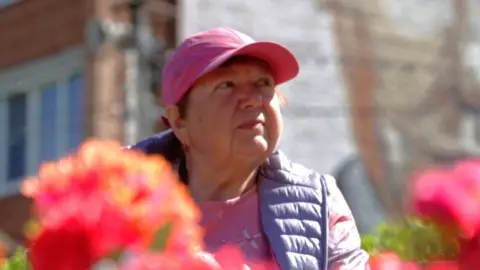
“We don’t know who would come next if Putin goes,” says Valentina
To find out I drive to the town of Kashira, 70 miles from Moscow. Here a gigantic Putin portrait, a massive mural, takes up one whole side of an apartment block.
In Kashira Big Vladimir is watching you. “I like him,” says pensioner Valentina who is selling flowers by the roadside. “Putin has good ideas and does a lot for people. True, our pensions aren’t big. But he can’t fix everything in one go.”
“He’s had nearly 25 years,” I point out.
“But we don’t know who’d come next [if Putin goes],” Valentina replies.
“In Russia we’re all expected to think the same way,” says Victoria, who is walking past the Putin mural. “If I say anything against Putin my husband says: ‘You criticise Putin again and I’ll divorce you!’ He’s mad about him. He says that if it wasn’t for Putin life here would be as tough as in the 1990s.”
When I ask another passer-by, Alexander, what he thinks of the president, he replies: “It can be dangerous now to express an opinion. No comment.”
Most of the people I talk to say that they walk past Putin’s portrait without even noticing it now. They’re used to it.
Just like they’ve grown used to one man running Russia and no imminent prospect of change in the Kremlin.
(BBC)
-

 Features7 days ago
Features7 days agoSearching for Dayan Jayatilleka
-

 News7 days ago
News7 days agoBIA thrown into turmoil as foreign firm handles on-arrival visa counter
-

 News5 days ago
News5 days agoLankan wins UK’s prestigious hair and beauty awards 2024
-

 Business5 days ago
Business5 days agoUSDA Under Secy Taylor visits New Anthoney’s Farms and commends its pursuit towards sustainable poultry practices
-

 News6 days ago
News6 days agoImprovement in garment sector orders in first two months of 2024, but still to see 2022 volumes
-

 Editorial6 days ago
Editorial6 days agoChaos at BIA
-

 News5 days ago
News5 days agoVisa scandal exposed after airport chaos
-

 News4 days ago
News4 days agoSLPP renews call for early general election after UNP’s poor May Day show


